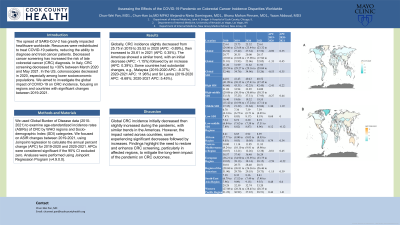Tuesday Poster Session
Category: Colon
P3624 - Assessing the Effects of the COVID-19 Pandemic on Colorectal Cancer Incidence Disparities Worldwide
Tuesday, October 29, 2024
10:30 AM - 4:00 PM ET
Location: Exhibit Hall E

Has Audio

Chun-Wei Pan, MD
John H. Stroger, Jr. Hospital of Cook County
Chicago, IL
Presenting Author(s)
Chun-Wei Pan, MD1, Chun-Han Lo, MD, MPH2, Alejandro J. Nieto Dominguez, MD1, Bhanu Siva Mohan Pinnam, MD1, Yazan Abboud, MD3
1John H. Stroger, Jr. Hospital of Cook County, Chicago, IL; 2Kirk Kerkorian School of Medicine at the University of Nevada, Las Vegas, NV; 3Rutgers New Jersey Medical School, Newark, NJ
Introduction: The spread of SARS-CoV-2 has greatly impacted healthcare worldwide. Resources were redistributed to treat COVID-19 patients, reducing the ability to diagnose and treat cancer patients. Decreased cancer screening has increased the risk of late colorectal cancer (CRC) diagnosis. Worldwide, CRC screening decreased by >30% between March 2020 and May 2021. In the US, colonoscopies decreased in 2020, especially among lower socioeconomic populations. We aimed to investigate the global impact of COVID-19 on CRC incidence, focusing on regions and countries with significant changes between 2019-2021.
Methods: We used Global Burden of Disease data (2010-2021) to examine age-standardized incidence rates (ASIRs) of CRC by WHO regions and Socio-demographic Index (SDI) categories. We focused on ASIR changes between 2019-2021, using Joinpoint regression to calculate the annual percent change (APC) for 2019-2020 and 2020-2021. APCs were considered significant if the 95% CI excluded zero. Analyses were performed using Joinpoint Regression Program.
Results: Globally, CRC incidence slightly decreased from 25.75 in 2019 to 25.52 in 2020 (APC: -0.89%), then increased to 25.61 in 2021 (APC: 0.35%). The Americas showed a similar trend, with an initial decrease (APC: -1.15%) followed by an increase (APC: 0.39%). High SDI countries had the highest incidence but consistently decreased from 41.43 in 2019 to 40.52 in 2021. Low and low-middle SDI countries had the lowest incidence, remaining relatively stable. Some countries had substantial changes, e.g., Malaysia (2019-2020 APC: -8.37%; 2020-2021 APC: 11.96%), Sri Lanka (2019-2020 APC: -8.68%; 2020-2021 APC: 5.45%), and United Arab Emirates (2019-2020 APC: -26.6%; 2020-2021 APC: -5.81%) (Figure 1).
Discussion: Global CRC incidence initially decreased then slightly increased during the pandemic, with similar trends in the Americas. However, the impact varied across countries, some experiencing significant decreases followed by increases. Findings highlight the need to restore and enhance CRC screening, particularly in affected regions, to mitigate the long-term impact of the pandemic on CRC outcomes.

Note: The table for this abstract can be viewed in the ePoster Gallery section of the ACG 2024 ePoster Site or in The American Journal of Gastroenterology's abstract supplement issue, both of which will be available starting October 27, 2024.
Disclosures:
Chun-Wei Pan, MD1, Chun-Han Lo, MD, MPH2, Alejandro J. Nieto Dominguez, MD1, Bhanu Siva Mohan Pinnam, MD1, Yazan Abboud, MD3. P3624 - Assessing the Effects of the COVID-19 Pandemic on Colorectal Cancer Incidence Disparities Worldwide, ACG 2024 Annual Scientific Meeting Abstracts. Philadelphia, PA: American College of Gastroenterology.
1John H. Stroger, Jr. Hospital of Cook County, Chicago, IL; 2Kirk Kerkorian School of Medicine at the University of Nevada, Las Vegas, NV; 3Rutgers New Jersey Medical School, Newark, NJ
Introduction: The spread of SARS-CoV-2 has greatly impacted healthcare worldwide. Resources were redistributed to treat COVID-19 patients, reducing the ability to diagnose and treat cancer patients. Decreased cancer screening has increased the risk of late colorectal cancer (CRC) diagnosis. Worldwide, CRC screening decreased by >30% between March 2020 and May 2021. In the US, colonoscopies decreased in 2020, especially among lower socioeconomic populations. We aimed to investigate the global impact of COVID-19 on CRC incidence, focusing on regions and countries with significant changes between 2019-2021.
Methods: We used Global Burden of Disease data (2010-2021) to examine age-standardized incidence rates (ASIRs) of CRC by WHO regions and Socio-demographic Index (SDI) categories. We focused on ASIR changes between 2019-2021, using Joinpoint regression to calculate the annual percent change (APC) for 2019-2020 and 2020-2021. APCs were considered significant if the 95% CI excluded zero. Analyses were performed using Joinpoint Regression Program.
Results: Globally, CRC incidence slightly decreased from 25.75 in 2019 to 25.52 in 2020 (APC: -0.89%), then increased to 25.61 in 2021 (APC: 0.35%). The Americas showed a similar trend, with an initial decrease (APC: -1.15%) followed by an increase (APC: 0.39%). High SDI countries had the highest incidence but consistently decreased from 41.43 in 2019 to 40.52 in 2021. Low and low-middle SDI countries had the lowest incidence, remaining relatively stable. Some countries had substantial changes, e.g., Malaysia (2019-2020 APC: -8.37%; 2020-2021 APC: 11.96%), Sri Lanka (2019-2020 APC: -8.68%; 2020-2021 APC: 5.45%), and United Arab Emirates (2019-2020 APC: -26.6%; 2020-2021 APC: -5.81%) (Figure 1).
Discussion: Global CRC incidence initially decreased then slightly increased during the pandemic, with similar trends in the Americas. However, the impact varied across countries, some experiencing significant decreases followed by increases. Findings highlight the need to restore and enhance CRC screening, particularly in affected regions, to mitigate the long-term impact of the pandemic on CRC outcomes.

Figure: Figure 1. Annual Percentage Change (APC) in Age-Standardized Incidence Rates of Colorectal Cancer (CRC) Worldwide: A) 2019-2020 and B) 2020-2021
Note: The table for this abstract can be viewed in the ePoster Gallery section of the ACG 2024 ePoster Site or in The American Journal of Gastroenterology's abstract supplement issue, both of which will be available starting October 27, 2024.
Disclosures:
Chun-Wei Pan indicated no relevant financial relationships.
Chun-Han Lo indicated no relevant financial relationships.
Alejandro Nieto Dominguez indicated no relevant financial relationships.
Bhanu Siva Mohan Pinnam indicated no relevant financial relationships.
Yazan Abboud indicated no relevant financial relationships.
Chun-Wei Pan, MD1, Chun-Han Lo, MD, MPH2, Alejandro J. Nieto Dominguez, MD1, Bhanu Siva Mohan Pinnam, MD1, Yazan Abboud, MD3. P3624 - Assessing the Effects of the COVID-19 Pandemic on Colorectal Cancer Incidence Disparities Worldwide, ACG 2024 Annual Scientific Meeting Abstracts. Philadelphia, PA: American College of Gastroenterology.
